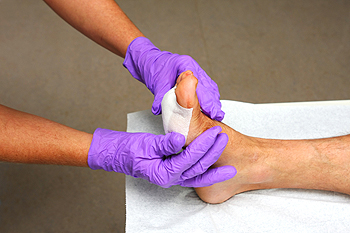
Healing a minor foot wound involves several important steps and visiting a podiatrist to ensure proper care and recovery. This doctor begins by gently cleaning the wound with mild soap and water to remove dirt and debris, then pats the area dry with a clean towel to avoid further irritation. He or she will guide you to use an antibiotic cream on the wound to prevent infection and promote healing. Next, the wound is covered with a sterile bandage or dressing, ensuring it fits snugly but comfortably to protect the area from dirt and bacteria. The podiatrist will explain how to change the bandage if it becomes wet or dirty, in addition to monitoring the wound for signs of infection such as increased redness, swelling, or pus. If you have a foot wound, it is strongly suggested that you are under the care of a podiatrist who can treat it effectively and safely.
Wound care is an important part in dealing with diabetes. If you have diabetes and a foot wound or would like more information about wound care for diabetics, consult with one of our podiatrists from Centers for Foot & Ankle Care. Our doctors will assess your condition and provide you with quality foot and ankle treatment.
What Is Wound Care?
Wound care is the practice of taking proper care of a wound. This can range from the smallest to the largest of wounds. While everyone can benefit from proper wound care, it is much more important for diabetics. Diabetics often suffer from poor blood circulation which causes wounds to heal much slower than they would in a non-diabetic.
What Is the Importance of Wound Care?
While it may not seem apparent with small ulcers on the foot, for diabetics, any size ulcer can become infected. Diabetics often also suffer from neuropathy, or nerve loss. This means they might not even feel when they have an ulcer on their foot. If the wound becomes severely infected, amputation may be necessary. Therefore, it is of the upmost importance to properly care for any and all foot wounds.
How to Care for Wounds
The best way to care for foot wounds is to prevent them. For diabetics, this means daily inspections of the feet for any signs of abnormalities or ulcers. It is also recommended to see a podiatrist several times a year for a foot inspection. If you do have an ulcer, run the wound under water to clear dirt from the wound; then apply antibiotic ointment to the wound and cover with a bandage. Bandages should be changed daily and keeping pressure off the wound is smart. It is advised to see a podiatrist, who can keep an eye on it.
If you have any questions, please feel free to contact one of our offices located in Merrillville, Portage, Michigan City/LaPorte, and Schererville, IN . We offer the newest diagnostic and treatment technologies for all your foot care needs.
